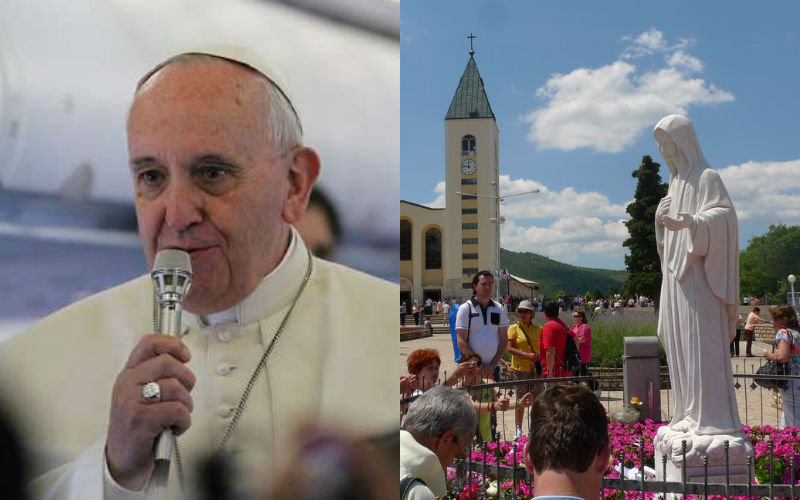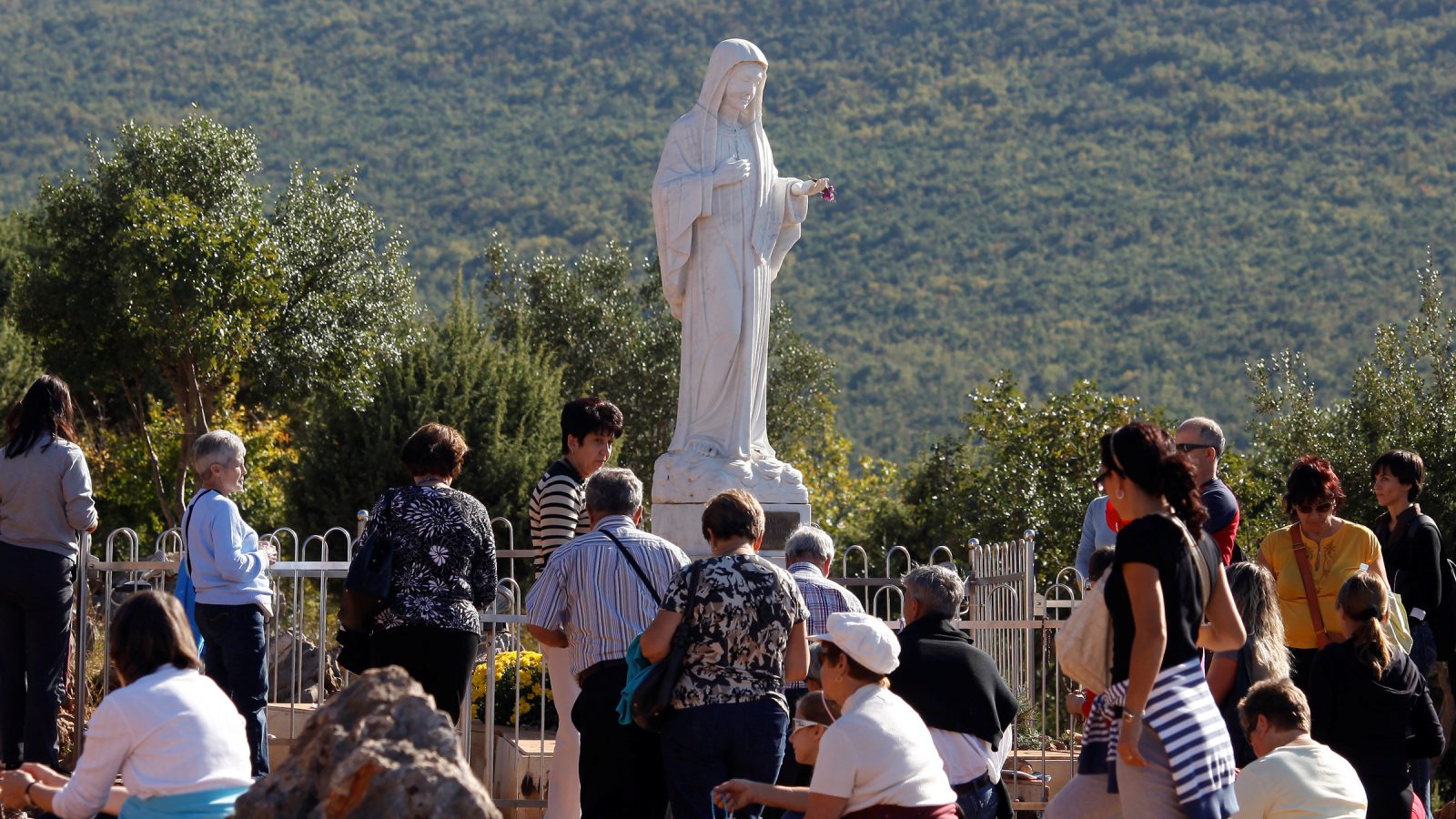Pope Francis & Medjugorje: Latest Updates & Insights
Is it possible to reconcile skepticism with spiritual openness? Pope Francis, a figure often associated with both, has navigated the complex terrain of faith, particularly concerning the Marian apparitions in Medjugorje, with a nuanced approach, balancing doubt with a recognition of the spiritual fruits produced.
The small town of Medjugorje, nestled in Bosnia and Herzegovina, has become a focal point of pilgrimage and spiritual devotion over the past four decades. The core of the matter revolves around reported apparitions of the Virgin Mary to local individuals. These events have drawn millions of visitors, igniting both fervent belief and considerable scrutiny from the Catholic Church.
The Holy See, guided by the local bishops' rulings, initially allowed pilgrimages to Medjugorje. Pope Francis, in May 2019, formalized this allowance, a decision that didn't automatically validate the alleged apparitions, but rather provided a framework for pilgrimage within specified boundaries. This action underscores a practical approach to the situation, where pastoral care and the spiritual needs of the faithful are prioritized.
It's crucial to understand that the Church has not yet issued a definitive verdict on the authenticity of the apparitions. While the Church has approved the organization of pilgrimages to Medjugorje, it also advises against creating confusion or ambiguity regarding the Church's official stance on the matter. The focus has been on facilitating the spiritual experience without compromising the integrity of Church doctrine. The Pope, in various statements, has emphasized that any apparitions or presumed apparitions remain within the realm of private revelation, not as an official part of the Church's dogma.
Pope Francis himself has expressed his personal reservations about the reported events. In November 2013, he alluded to the "chatty nature" of the Virgin Mary in Medjugorje, where believers claim she delivers multiple messages daily. This statement reflects a cautious perspective, one that doesn't deny the possibility of spiritual experience, but which also underscores the necessity of critical evaluation. This stance is consistent with the Church's general approach to such phenomena, urging prudence and discernment.
To navigate the complexities of the situation, Pope Francis has appointed special envoys to Medjugorje. Archbishop Henryk Hoser, a Polish prelate, was initially assigned to oversee all aspects of pastoral ministries. This extended to include the oversight of pastoral needs in the region. The work of Archbishop Hoser provided a comprehensive understanding of the spiritual environment, offering valuable insights into the lives of pilgrims and the local community.
In May 2019, Pope Francis lifted the ban on organized pilgrimages, a significant move. The decision allowed Catholics to travel to Medjugorje under the auspices of the Church. This decision was guided by a desire to offer the faithful the opportunity to experience the spirituality offered within Medjugorje, while also ensuring that pilgrimages were conducted within the framework of Church guidelines. The Church's guidance has been steadfast that such pilgrimages should not present the reported apparitions as definitively approved.
The Dicastery for the Doctrine of the Faith (DDF), with the Pope's approval, has issued a note about the spiritual experience in Medjugorje. The DDF's role is to safeguard the doctrinal integrity of the Church, so its input is highly relevant to the discussion around Medjugorje. In August 2024, Pope Francis granted approval for devotions connected to Medjugorje. This decision allows for formal expressions of faith and devotion at Medjugorje. The DDF emphasized that this approval is rooted in the abundant spiritual fruits observed at the sanctuary, not in a declaration about the supernatural nature of the events.
Pope Francis's actions suggest a pastoral approach: he acknowledges the spiritual impact of Medjugorje on believers, while upholding the Church's standard of prudence and caution. He has consistently aimed to guide the faithful while maintaining fidelity to the core tenets of the Catholic faith. In doing so, he is embodying the role of pastor, tending to the spiritual needs of the flock, even in matters that remain under ongoing consideration.
Cardinal Kevin Farrell, Camerlengo of the Apostolic Chamber, announced the passing of Pope Francis from the Casa Santa Marta at 9:45 a.m. However, this information appears to be a misinterpretation and is not supported by any credible source. The source appears to confuse Pope Francis with the news of his death.
Pope Francis, a pontiff known for his compassion and accessibility, continues to shape the Church's approach to the world. His approach towards Medjugorje demonstrates a blend of spiritual sensitivity, critical thinking, and the commitment to the pastoral needs of believers. The case of Medjugorje shows a complex and sensitive area of belief and discernment, with the Church's response always seeking a balance between faith and reason.
The international youth festival is a further example of Pope Francis's efforts to guide the faithful. The Pope sent a message to the participants, urging them to open their hearts to the will of God. He conveyed his joy in being able to address the festival, which was centered around the theme "Mary has chosen the better part." Pope Francis has focused on offering spiritual guidance. He highlights the importance of trust and placing one's faith in God's grace. Such messages are designed to strengthen the faith of the youth and inspire them in their journey of belief.
The Ruini Report, a document examining the apparitions, was delivered to Pope Francis on January 17, 2014. Commenting on the report in 2017, Pope Francis acknowledged the real spiritual fruits associated with Medjugorje. This acknowledgement reflects his nuanced viewpoint, recognizing the positive influence it has had on the lives of believers. By recognizing the spiritual fruits, the Pope maintains his balance between prudence and recognizing the power of faith.
| Aspect | Details |
|---|---|
| Name | Medjugorje |
| Location | Bosnia and Herzegovina |
| Significance | A site of alleged Marian apparitions, attracting millions of pilgrims. |
| Church's Stance | The Church has not yet given a verdict on the authenticity of the apparitions. |
| Pope Francis's Actions | Authorized pilgrimages, appointed special envoys, and approved devotions. |
| Key Events | Reported apparitions, lifting of the ban on pilgrimages, and approval for devotions in August 2024. |
| Spiritual Fruits | Acknowledged by the Church as real and abundant, despite the lack of a verdict on the apparitions. |
| Pastoral Approach | Pope Francis balances skepticism with openness to spiritual experiences and provides pastoral guidance. |
| Cautionary Measures | Pilgrimages are not to present the reported apparitions as approved. Emphasis on not creating confusion or ambiguity. |
Pope Francis's stance on Medjugorje is an important demonstration of his leadership. The choices he has made have helped guide the faithful. The approach he has taken is an intricate mix of faith, discernment, and pastoral care. The story of Medjugorje illustrates how the Church must navigate difficult questions of faith and spirituality.
The Holy See, acting with due consideration, has allowed pilgrimages and organized religious events in Medjugorje. This action has been taken in consultation with the local bishops. Pope Francis formally authorized them in May 2019, but with the stipulation that such events do not present the reported apparitions as officially approved by the Church. This decision reflects a careful balance.
Since May 2019, Pope Francis has officially authorized the organization of pilgrimages to Medjugorje. The Pope has emphasized caution, in doing so, the goal is to prevent confusion or ambiguity that might undermine the Church's stance. The Church has not yet issued a verdict regarding the authenticity of the apparitions. This is reflected in the organized pilgrimages, with the intention of fostering spiritual experiences. They do not constitute definitive endorsement.
The Dicastery for the Doctrine of the Faith is responsible for safeguarding the integrity of the Church's doctrine. With the Pope's approval, the dicastery has issued a note about the spiritual experience in Medjugorje. It acknowledges the genuine spiritual fruits received at the sanctuary. The DDF doesn't make a declaration on the supernatural nature of the events. The approach is to acknowledge the spiritual impacts without making a definitive statement.
In August 2024, Pope Francis granted approval for devotions connected to Medjugorje. The Church's acceptance of spiritual practices offers a chance for the faithful to connect with their faith. The focus remains on recognizing the spiritual gains, promoting faith in action, and the growth of the individual and the community.
Archbishop Henryk Hoser, served as the resident apostolic visitor to Medjugorje. The Archbishop's work has been critical in guiding the Church's actions in the area. His work helped in shaping the pastoral needs of the community. His leadership provides the knowledge needed to guide the faith and the spiritual experiences in Medjugorje.
Pope Francis's pastoral care demonstrates a deep understanding of the faithful. By acknowledging spiritual fruits, he shows the importance of faith. He has shown that the Church's leadership can be compassionate. He recognizes the value of individual spiritual experiences, whilst ensuring the integrity of the Church's teachings.
Throughout this delicate situation, Pope Francis has demonstrated a capacity to navigate. It includes skepticism, faith, and pastoral care. His actions and statements reflect the Church's ongoing dialogue with the mystery of faith. His decisions underscore a commitment to serving the faithful.

/arc-anglerfish-tgam-prod-tgam.s3.amazonaws.com/public/7EOABZEDTZGNBKB2K7CXA4YLB4.jpg)
